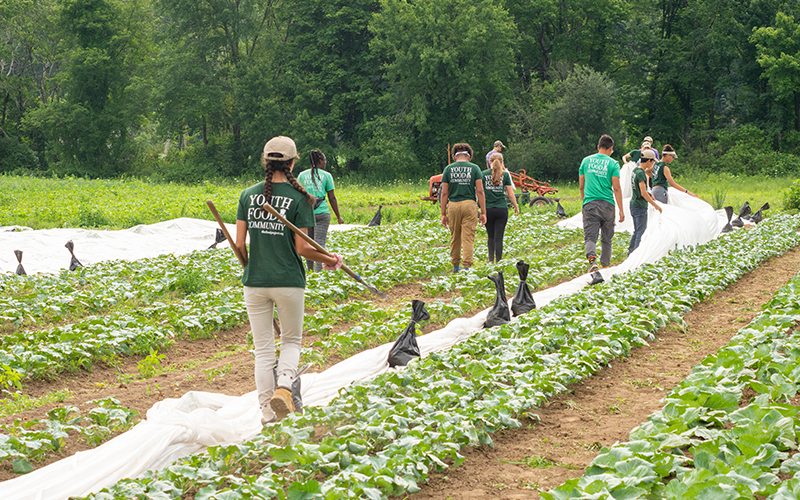March 1, 2022

In this final installment of Farm Credit East’s ESG series, we head to Boston, Massachusetts, to learn more about The Food Project, an organization working to create a thoughtful and productive community of youth and adults who work together to build a more just and sustainable food system. Educating youth in agriculture — both those who plan to enter a career in the industry and those who will be future consumers — is a core focus of Farm Credit East’s ESG strategy.
Since The Food Project’s founding, it has aimed to empower youth leaders to seek change in the food system by equipping them with skills in agriculture, critical thinking and public speaking. “We bring together high school students and provide them with a level playing field to partake in meaningful work,” said Anne Hayes, executive director of The Food Project. “The best part is the students get to see the products they grow go to people experiencing food insecurity.”
Students from the city and surrounding metro areas first participate in a six-week program called Seed Crew, which includes time spent farming, learning about the food system, and interacting with farmers and each other to get to know people who are different races, gender identities, socioeconomic classes, etc. Once a week, the students also work with hunger relief partners, including soup kitchens, food pantries and transitional housing, to chop veggies or clean raised beds.
“This is when students interact with the people who are benefitting from their work, and that’s when the light bulbs go off as to why their work is so important,” continued Anne.
Students can later graduate to participate in Dirt Crew, leading farm tours or constructing raised beds (the organization builds about 100 community beds per year), and then Root Crew, which includes more specialized agricultural work. Students are paid in all tracks of the program, and Anne noted a recent alumni study found how transferrable the skills learned are into other fields, including the many who pursued agricultural fields. To date, The Food Project has graduated over 1,800 youth among the three tracks
Alongside youth leadership development, The Food Project grows about 200,000 pounds of food each year, of which half is donated to hunger relief partners or sold at affordable farmers’ markets that participate in Supplemental Nutrition Assistance Program (SNAP) and the Massachusetts Healthy Incentives Program (HIP).
In addition to engaging the next generation, a core component of Farm Credit East’s ESG focus is expanding access to fresh, healthy food. Anne noted that only 7% of people who are eligible for SNAP are aware of HIP, so The Food Project provides extensive HIP education, marketing and outreach to expand awareness, of which Farm Credit East contributed funds in 2021.
Anne concluded, “When organizations like Farm Credit East give us a few thousand dollars, we’re able to increase awareness, which opens doors for people to have better access to food, and it’s really amazing.”
To learn more about The Food Project, visit TheFoodProject.org.
Farm Credit East is proud to support the work of organizations like The Food Project along with the others we have featured throughout our ESG blog series. Revisit the blogs linked below to learn more about each organization’s important work.
Buffalo Go Green: Improving Access to Fresh Food and Expanding Diversity in Agriculture
Curriculum for Agricultural Science Education (CASE): Developing the next generation of agriculture
Three River Farmers Alliance: Connecting farmers with expanded markets




